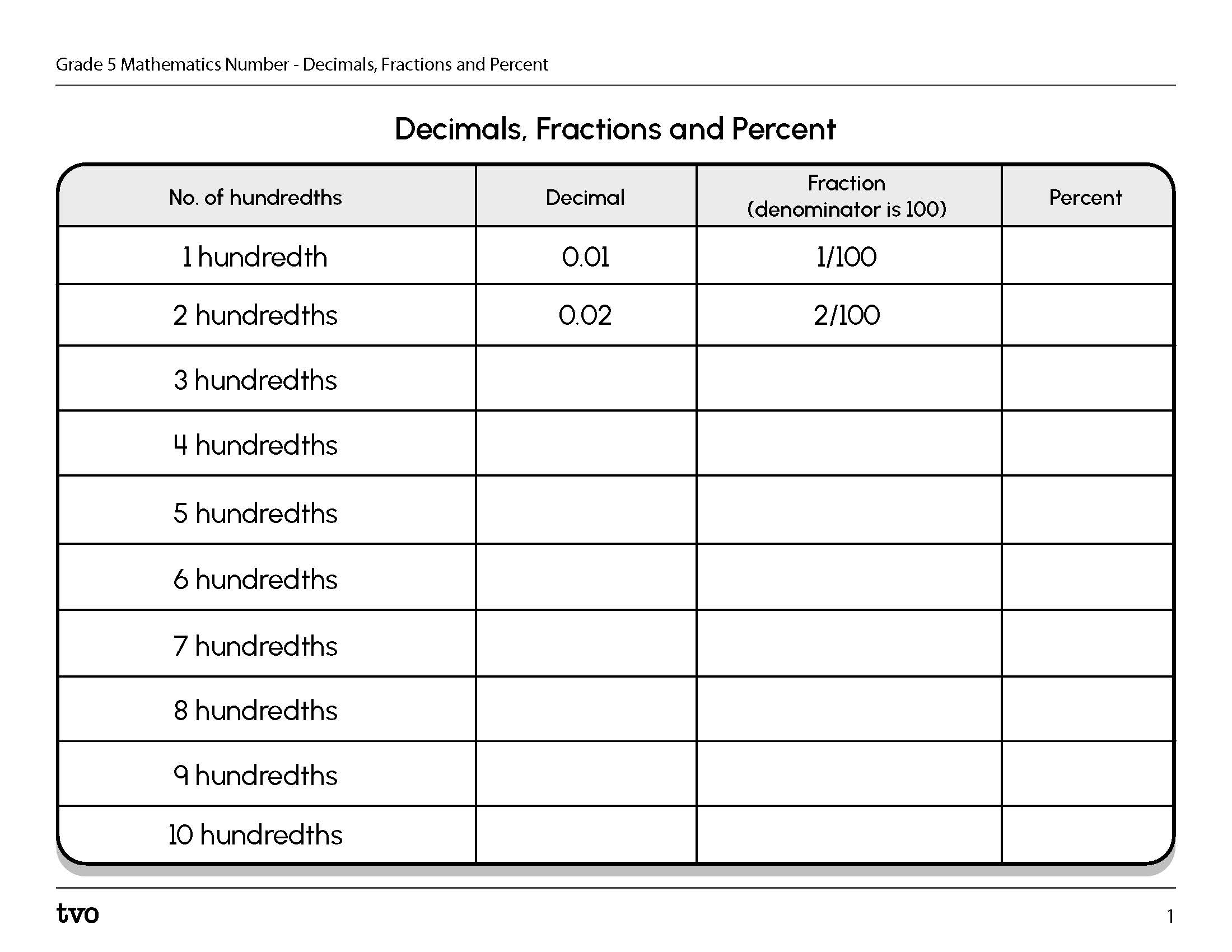Minds On
Exploring hundredths
Examine the following base ten manipulative called a “flat”.

A base ten “flat” is made of 100 unit blocks, or 10 rows of 10 blocks.
1 unit block is equal to 1 hundredth.
Brainstorm
Brainstorm
How might we express one hundredth in the following ways:
- as a picture or diagram?
- as a decimal?
- as a fraction?
If possible, share your thinking with a partner.
Action
Expressing tenths and hundredths

The term tenth means there are 10 equal parts in the whole.
Similarly, the term hundredth means there are one hundred equal parts in the whole.

One tenth means that we have 1 piece of the whole, and that the whole is made up of 10 equal parts.

One hundredth means that we have 1 piece of the whole, and that the whole is made up of 100 equal parts.
Does this seem familiar to you?
Examine the following image that shows how hundredths can be expressed as fractions!

We can express parts of a whole in many different ways including as fractions and also as decimals.
Examine the following chart which shows different ways of expressing one tenth and one hundredth.
| In words | One tenth | One hundredth |
|---|---|---|
| In pictures |

|

|
| As a decimal | ||
| As a fraction |
Decimals and fractions

Let’s practice converting hundredths to decimal and fraction form.
Complete “Decimals, Fractions and Percent” in your notebook or using the following fillable and printable document. If you would like, you can use speech-to-text or audio recording tools to record your thoughts.
At this time, you only need to complete the two columns with the headings: “Decimal” and “Fraction (denominator is 100)”.

Press the Activity button to access the Decimals, Fractions and Percent.
Activity (Open PDF in a new tab)Percent
The symbol, or percent sign, % means out of 100.
Either the denominator is 100 or we consider that the whole is divided into 100 equal parts.
ONE HUNDREDTH can be expressed as:
- a decimal:
- a fraction:
- a percentage:
Now go back and complete the last column of the “Decimals, Fractions, and Percent” activity and express each hundredth in the chart as a percent.
Consolidation
Complete the missing cells in the table
Complete Fun Math Facts in your notebook or using the following fillable and printable document. For each row in the table, use the bolded value to fill in the missing cell for each row.
| Percent | Fraction (out of 100) | Decimal |
|---|---|---|
| 71% of the Earth is made up of water | ||
| Oceans hold just a little over 0.96 of ALL of the Earth’s water | ||
| up to 80% of the world’s oxygen is produced by Earth’s oceans | ||
| Orangutans and humans share 97% of the same DNA | ||
| More than 3 billion adults get units of their protein intake from eating fish |
Press the ‘Activity’ button to access Fun Math Facts.
Focus on the forests

A long-time public belief is that 20% of the world’s oxygen is produced by the Amazon Rainforest.
Express this amount as a decimal and a fraction.
Student Success
Think
Do you know any other fun math facts related to real life that can be expressed as a percent, a decimal, and a fraction?
Select an appropriate tool to express the percent, decimal and fraction equivalencies.
Record your thinking in print, digitally or with an audio recording.
Reflection
What did you learn in this lesson?
What was the most helpful part of this lesson? Why?
As you read through these descriptions, which sentence best describes how you are feeling about your understanding of this learning activity? Press the button that is beside this sentence.
I feel...
Now, record your ideas using a voice recorder, speech-to-text, or writing tool.
Connect with a TVO Mathify tutor
Think of TVO Mathify as your own personalized math coach, here to support your learning at home. Press ‘TVO Mathify’ to connect with an Ontario Certified Teacher math tutor of your choice. You will need a TVO Mathify login to access this resource.
TVO Mathify (Opens in a new tab)